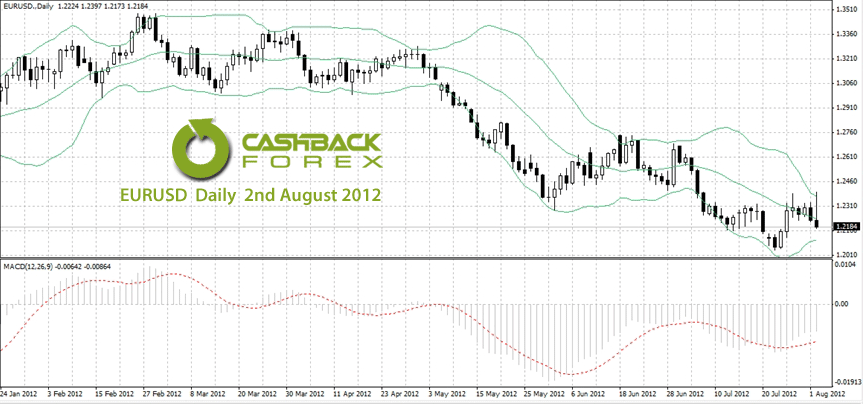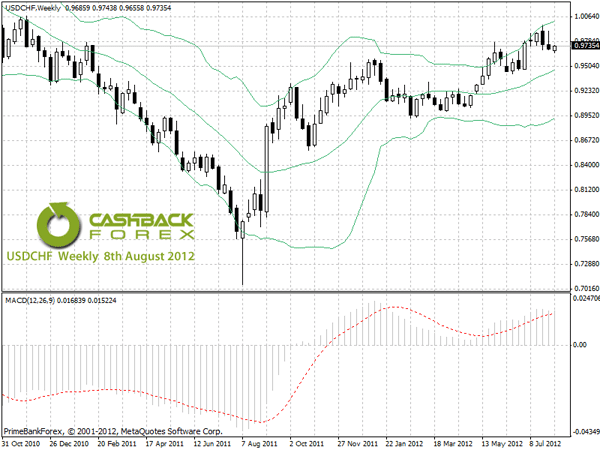Edit Your Comment
When Do We Buy the Swiss Franc?
May 24, 2012 zamanından beri üye
7 iletiler
Aug 09, 2012 at 10:51
May 24, 2012 zamanından beri üye
7 iletiler
There has been a steady barrage of conflicting information about the euro during the past week. The euro market was deflated after the ECB President Draghi's press conference, but quickly reversed once Spain announced there was a break through, and lower borrowing rates would be available in the near future.
Specifics of such a Spanish bail out have yet to be revealed. Further, there continue to be rumors of major disagreements between the Germans, Spanish and the Italians. Spain, not having any debt auctions scheduled until October, does have time to find a way to bring down the borrowing rates. To date this year, Spain has covered maturing debt obligations with short term paper. Borrowing short to cover long term debt, buys time, but it is very dangerous and often leads to default.
The euro versus the USD was a very popular short and has been due for a rally. While there was some short covering in the euro, and because of the Swiss National Bank peg, related short covering in the Swiss Franc, much of the weakness in the USD was caused by selling against purchases of the commodity currencies. Our COT Report showed the total USD long was reduced by 89.4K futures contracts during the most recent period.
Prior to intervention by the SNB, the Swissie had become a safe haven for speculators, fearful of both the euro and the USD. Consequently, the SF reached parity versus the euro, and the USD purchased only .75 of a Franc.
The SNB bank has had success, the USD is back to .9750, and the SF versus the euro is at the 1.20 peg level. The weaker franc has brought full employment to Switzerland. Announced Tuesday last, the unemployment rate was only 2.7%.
The success in devaluing the franc comes with a price. Each month the SNB is required to buy the overvalued euros and add to their growing inventory of currency reserves. In July they rose by $43B following big increases in previous months. Total reserves now total 80% of the GDP. For further details please refer to an excellent article by Bruce Krasting, "How to Lose Friends and Make Enemies."
When will the SNB conclude they have bought enough overpriced euros? Should currency speculators be extremely short the franc as they are now, how quickly would the franc achieve parity versus the euro?
It is hard to predetermine which event (s) might cause the SNB to change their policies. Perhaps poor bank earnings will be the catalyst as it was several years ago, or perhaps it will be political turmoil in neighboring parts of Europe. With much of the eurozone encountering economic difficulties, Switzerland and the franc will remain a haven.
We think selling the EURCHF at better than the 1.20 handle is a way to be positioned to take advantage, should chaos spread because of the debt and or liquidity problems.


Specifics of such a Spanish bail out have yet to be revealed. Further, there continue to be rumors of major disagreements between the Germans, Spanish and the Italians. Spain, not having any debt auctions scheduled until October, does have time to find a way to bring down the borrowing rates. To date this year, Spain has covered maturing debt obligations with short term paper. Borrowing short to cover long term debt, buys time, but it is very dangerous and often leads to default.
The euro versus the USD was a very popular short and has been due for a rally. While there was some short covering in the euro, and because of the Swiss National Bank peg, related short covering in the Swiss Franc, much of the weakness in the USD was caused by selling against purchases of the commodity currencies. Our COT Report showed the total USD long was reduced by 89.4K futures contracts during the most recent period.
Prior to intervention by the SNB, the Swissie had become a safe haven for speculators, fearful of both the euro and the USD. Consequently, the SF reached parity versus the euro, and the USD purchased only .75 of a Franc.
The SNB bank has had success, the USD is back to .9750, and the SF versus the euro is at the 1.20 peg level. The weaker franc has brought full employment to Switzerland. Announced Tuesday last, the unemployment rate was only 2.7%.
The success in devaluing the franc comes with a price. Each month the SNB is required to buy the overvalued euros and add to their growing inventory of currency reserves. In July they rose by $43B following big increases in previous months. Total reserves now total 80% of the GDP. For further details please refer to an excellent article by Bruce Krasting, "How to Lose Friends and Make Enemies."
When will the SNB conclude they have bought enough overpriced euros? Should currency speculators be extremely short the franc as they are now, how quickly would the franc achieve parity versus the euro?
It is hard to predetermine which event (s) might cause the SNB to change their policies. Perhaps poor bank earnings will be the catalyst as it was several years ago, or perhaps it will be political turmoil in neighboring parts of Europe. With much of the eurozone encountering economic difficulties, Switzerland and the franc will remain a haven.
We think selling the EURCHF at better than the 1.20 handle is a way to be positioned to take advantage, should chaos spread because of the debt and or liquidity problems.


Get Paid To Trade

*Ticari kullanım ve istenmeyen e-postalara müsamaha gösterilmez ve hesabın feshedilmesine neden olabilir.
İpucu: Bir resim/youtube urlsi yayınlamak, onu otomatik olarak gönderinize gömer!
İpucu: Bu tartışmaya katılan bir kullanıcı adını otomatik olarak tamamlamak için @ işaretini yazın.













